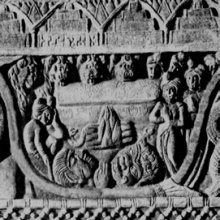Uraga Jataka, Uraga-jātaka: 1 definition
Introduction:
Uraga Jataka means something in Buddhism, Pali. If you want to know the exact meaning, history, etymology or English translation of this term then check out the descriptions on this page. Add your comment or reference to a book if you want to contribute to this summary article.
Images (photo gallery)
In Buddhism
Theravada (major branch of Buddhism)
Source: Pali Kanon: Pali Proper Names1. Uraga Jataka (No. 154) - King Brahmadatta of Benares once held a festival to which came the inhabitants of many worlds. A Naga in the crowd, not noticing that the person beside him was a Garuda, laid a hand on his shoulder; discovering his mistake, he was frightened to death and ran away, pursued by the Garuda. The Naga, coming to a river, where an ascetic, who was the Bodhisatta, was bathing, took refuge in the ascetics bark garment. The Garuda, though able to see the Naga, would not attack him out of respect for the ascetic. The latter took both of them to his hermitage and made them friendly towards each other by preaching the blessings of loving kindness.
The story was related in reference to two soldiers who were in the habit of quarrelling whenever they met. Not even the king could reconcile them. The Buddha visited them at their homes and, having made them both sotapannas, took them to see each other. Thenceforth they were great friends, and people marvelled at the Buddhas power (J.ii.12-14). The Nakula Jataka was also preached in this connection.
2. Uraga Jataka (No. 354) - The Bodhisatta was once a brahmin in Benares. His household consisted of himself, his wife, a son, a daughter, a daughter in law and a female slave. They lived happily together, and on the Bodhisattas advice kept their thoughts constantly fixed on the inevitableness of death. One day, while burning some rubbish in the field, the son was bitten by a snake and died. The father laid his body under a tree, and having sent word to his house that all the others should come with perfumes and flowers, when bringing his meal, be went on with his work. After the meal they made a funeral pyre and burnt the body, but not one of them wept a single tear. By virtue of their piety, Sakkas throne was heated and he appeared to them in disguise. He questioned them separately as to whether their lack of any show of grief for the dead meant that they did not love him. Being convinced that their composure was due to their practice of the thought of death, he revealed his identity, and filled their house with the seven kinds of treasures. The story was related to a landowner of Savatthi who, when his son died, gave himself up to despair. The Buddha visited him and consoled him (J.iii.162ff).
This story is referred to in the Dhammapada Commentary DhA.iii.277.
Theravāda is a major branch of Buddhism having the the Pali canon (tipitaka) as their canonical literature, which includes the vinaya-pitaka (monastic rules), the sutta-pitaka (Buddhist sermons) and the abhidhamma-pitaka (philosophy and psychology).
See also (Relevant definitions)
Partial matches: Jataka, Uraga.
Full-text: Nakula.
Relevant text
Search found 2 books and stories containing Uraga Jataka, Uraga-jātaka; (plurals include: Uraga Jatakas, jātakas). You can also click to the full overview containing English textual excerpts. Below are direct links for the most relevant articles:
The Jataka tales [English], Volume 1-6 (by Robert Chalmers)
Dhammapada (Illustrated) (by Ven. Weagoda Sarada Maha Thero)
Verse 277-279 - The Story of Five Hundred Monks < [Chapter 20 - Magga Vagga (The Path)]
Verse 288-289 - The Story of Paṭācārā < [Chapter 20 - Magga Vagga (The Path)]
Verse 235-238 - The Story of the Son of a Butcher < [Chapter 18 - Mala Vagga (Impurities)]
